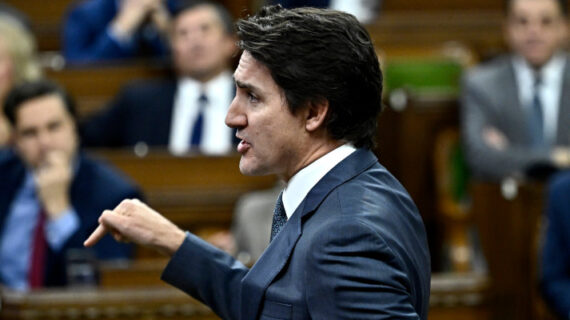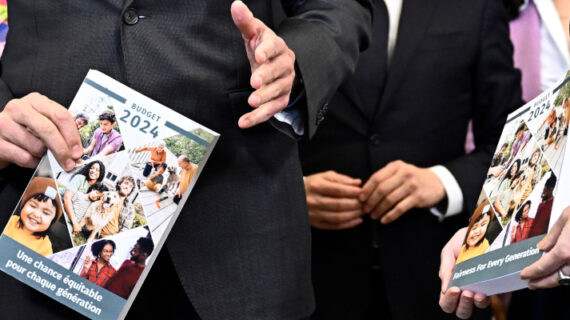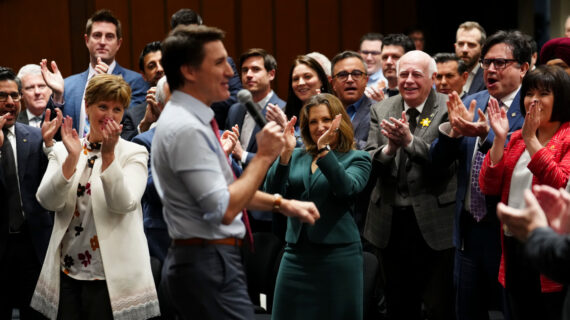Welcome to The Hub’s Federal Election 2021 Policy Pulse, where we’ll be tracking all the policy announcements from the major parties, with instant analysis from our crew of experts.
With the election scheduled for Sept. 20, we’ll be monitoring 36 days worth of policy ideas, so watch out each morning for the day’s live blog where we’ll be tracking every announcement as it happens.
4:30 p.m. — Don’t forget about rural Canadians when crafting environmental plans
Climate change and how to deal with it are top of mind for many Canadians as we emerge from our “infernal summer” and weigh the federal party platforms in the current election campaign.
While each party outlines its promises in tackling the issue, environmental policies should not be crafted thinking only of citizens living in urban areas; they need to consider the unique realities faced by rural residents.
In a publication launched Thursday, Olivier Rancourt, Krystle Wittevrongel, and Miguel Ouellette of the Montreal Economic Institute highlight three areas of environmental public policy in Canada that have the effect of amplifying the inequalities that exist between rural and urban areas. First, carbon pricing and the increased cost of fuel will not reduce demand for motorized vehicles in rural and agricultural regions as much as in urban areas. This increases out-of-pocket expenses for consumers in rural areas who have fewer transportation options. Second, the moratorium on developing natural gas in the province of Quebec is felt primarily in rural areas where this resource is located. And third, the overregulation that complicates the repurposing of oil and gas projects in Alberta has contributed to economic disparities in that province.
Rural Canadians earn incomes that are typically 16 percent lower than their urban counterparts, have higher unemployment rates, and see slower income growth than urban areas. Therefore, regardless of where the parties land on various environmental policies, such measures should consider the needs of rural Canadians, and they should have a clear environmental purpose that justifies the costs.
3:00 p.m. — Clever evasion or backtrack? Either way, O’Toole may be able to avoid the gun control hot potato
The Hub contributor Joanna Baron tackles the gun control issues that have bubbled up recently:
Erin O’Toole has proudly touted — and his party’s platform indicates — that his government would repeal the Liberals’ 2020 ban on more than 1,500 types of weapons.
During last night’s TVA debate, however, O’Toole said that his party would maintain a ban on assault rifles. Some took this to be a backtrack, but a gun-owners lobby group claimed it was merely a clever evasion, since assault rifles have been banned since ’77 (as opposed to “assault-style” rifles).
O’Toole may be able to avoid this hot potato altogether: the ban is subject to multiple constitutional challenges which claim that it exceeded the authority of the federal cabinet, was enacted by order-in-council without legislative transparency and wrongly banned rifles which have long been used for hunting and sporting purposes.
Rather than clarify his position, O’Toole went on to tout his party’s proposals to tackle gang violence, including amending the Criminal Code to make it difficult for those charged in connection with gang violence to obtain bail, and easier for prosecutors to prove a gang connection. The Tories’ platform also promises to impose mandatory minimum sentences on gun smugglers and repeat offenders convicted of gun crimes.
1:30 p.m. — If the PBO can’t cost the party platforms in time for a snap election, there are other options to consider
The Hub’s editor-at-large Sean Speer offers some alternatives to the PBO on costing party platforms:
As the third week of the federal election campaign comes to a close, we’re still waiting for the fiscal plans from two of the major political parties.
The source of the delay stems from a commitment that the Liberal Party made in the 2015 campaign to mandate the Parliamentary Budget Office (PBO), an office established by the previous Conservative government to support parliamentarians in understanding and analysing economic and fiscal issues, to provide independent cost estimates of the various political parties’ promises and platforms in the context of election campaigns. The platform commitment was subsequently effectuated in 2017 through an amendment to the Parliament of Canada Act.
This new role for the PBO process ran reasonably well in the 2019 federal campaign. It was a fixed election date which gave the political parties and the PBO ample time to produce and submit their full suite of policies and carry out the cost estimates respectively.
But in this year’s snap election there’s been a significant delay in the PBO’s ability to produce the cost estimates for the various parties due in large part to resource constraints. It’s believed, for instance, that the Conservative Party submitted its full-suite of policies to the PBO for costing on August 16 but more than two weeks later the estimates still aren’t available. This seems like a pretty serious flaw in a world in which minority parliaments and unpredictable election cycles are increasingly the norm.
The consequence is that we are now beyond the halfway point of the campaign, and we still don’t have a sense of the overall costs of the Conservative and NDP platforms and what they would mean for Ottawa’s deficit and debt in the coming years.
For some, including Hub contributor Ken Boessenkool, this reflects the flaw of giving the PBO this responsibility in the first place. Boessenkool has consistently argued that platform development and the accompanying fiscal costing ought to be the sole responsibility of political parties and involving the PBO doesn’t just produce these practical issues but has deeper, structural problems in which parties are brought within the purview of government and the legislature.
He may have a point but that doesn’t necessarily negate the underlying impetus for the Liberals’ initial idea to try to bring greater evidence and rigour to party platform development.
Given the increasing expectations that policy platforms serve as well-developed governing agendas for incoming governments, how can we ensure that the political parties have adequate capacities and resources to carry out rigorous policy development and ultimately produce policy platforms that can sustain a sensible governing agenda?
Different jurisdictions have sought to answer this question by using various means and methods to support policy development capacity within (or attached to) the political parties. Some, such as the United Kingdom, publicly fund policy and research capacity within political parties. (Former Prime Minister David Cameron, for instance, started his political career as a researcher in the Conservative Research Department which is part of the overall Conservative Party’s organization.) Others, such as Germany, publicly fund think tanks with clear affiliations to political parties. (In the German case, for instance, the Konrad Adenauer Foundation is a political party foundation associated with but independent of the center-right Christian Democratic Union.)
The basic insight of these different models is that there is a public interest in ensuring that political parties have the capacity and resources for policy development that can not only inform party platforms in the lead up to elections but also enable regular and ongoing policy thinking and analysis. There is, according to this view, a role for public funding to establish and support these policy-related capacities within (or attached to) political parties.
This is of course a debatable point. One can imagine that the notion of what economists call “positive externalities” as a justification for more public funding to political parties would encounter opposition in Canada. Maybe Boessenkool himself would object.
But if the lesson out of this failed experiment with the PBO isn’t that the underlying idea was fundamentally flawed but the solution – both from a conceptual and practical point-of-view – was wrong, maybe it’s worth considering whether Canada should move in the direction of some of these other countries.
11:45 a.m. — TVA debate shows a three-way race in Quebec
Antonia Maioni, a professor at McGill University, analyzes the TVA debate in Montreal last night:
About last night: the general consensus among the chattering commentator class was that there was no clear “winner” in last night’s French-language leaders’ debate. That may well be if we want to follow the sports analogy, but election debate are not all about KOs and own goals.
Election debates, and in particular those that come in the wake of a summer campaign played out mainly on social media, are important because they allow some focus to emerge from the wallpaper of electoral signage and campaign noise. We get to hear what political leaders are actually promising voters and how they defend and differentiate these ideas from their rivals. It also allows voters to take the measure of the man (in last night’s case, it was an all-male cast) who would be prime minister.
First things first, this was the first electoral debate in a long time where all four participants could actually engage with each other in French. Not only did this make for good television, for a change, it also allowed francophone voters to acknowledge that English-Canadian politicians can speak their language both literally and figuratively.
And this was Conservative leader Erin O’Toole’s biggest challenge: to introduce himself to the voting public as a credible alternative and to defend himself from attempts to define him as a scary conservative. On that note, he succeeded. Maybe it’s his military credentials, but his stoic calm played well against the wound-up Justin Trudeau, who often hogged the mic in a way that wasn’t pretty, and the smoother but also tightly wound Yves-Francois Blanchet, who baited O’Toole all evening. This reflected the increasingly obvious concern that the Conservatives may be eating into both Liberal and BQ support in Quebec.
The rookie Conservative leader had a few tense moments, including exchanges about daycare and health care. But he was not singled out for grilling on the environment, a top of mind policy issue for Quebecers; he acquitted himself well on the language issue — with a shout-out to Brian Mulroney; and, surprisingly for some observers, came out as the best defender of “zero tolerance” for sexual abuse in the armed forces. Still, he stayed on message a bit too much, to the point where the mention of his party’s “plan,” at least two dozen times by my count, could have turned into a very intoxicating drinking game. Another robocall repetition was the repeated reference to partnerships with his BFF Premier François Legault, in supporting Quebec’s autonomy and jurisdiction.
It’s not to say that Trudeau didn’t have a good debate, but it’s a format that brings out both the best and the worst in him. It’s no secret by now that Liberal support may be softening in Quebec, and it showed. He was put on the defensive from the first moment on air, with everyone, including Pierre Bruneau, the venerable moderator, on calling this election, to which the prime minister just didn’t have a good answer. Does it matter? Two weeks into a campaign, that question should be dead, but here it is, still alive and kicking.
The moderator also got in on the action in pummeling Trudeau on language issues, which is not a good look for a politician from Quebec. By the end of the evening, we saw Trudeau resort to Liberal strawmen tactics — the non-vaccinated “20 percent,” two-tier health care, and of course, Stephen Harper — and his own weakness for shooting from the hip, in suggesting that without a majority government, “we’ll be back here in 18 months.”
There’s not much to say, ironically for a French-language debate, about Yves-François Blanchet, except to say that he was true to himself, and vigourously defended his party’s defense of Quebec interests in the House of Commons. That’s pretty much the alpha and omega of the BQ, and by this point, it’s no surprise to anyone, in Quebec or elsewhere. But the one thing Blanchet did do, which is telling, is that he was able to put any doubts to rest that a protest vote could once again move from the BQ to the NDP. His exchanges with Jagmeet Singh were among the most abrasive, and his put-down of the NDP’s platform as “magical thinking” was the most quotable of the evening.
Overall, this first debate can be seen to reflect the trends already in motion of this election campaign: it’s a three-way race in Quebec, without the NDP. The launch of the Liberal policy platform will not likely reverse the softening trend line in their support elsewhere. And the Conservative leader has so far been successful in defending his image from his rivals.
Now it remains to be seen how the leaders can muster something interesting in the second debate in French and, crucially, how they prepare for their make or break performance on the national stage in the English language debate.
9:45 a.m. — Conservatives announce ‘gang exit strategy’ plan to partner with employers
Conservative leader Erin O’Toole was in Montreal this morning to highlight a plan to partner with local employers to employ a “gang exit strategy,” to give criminals a way out of the “cycle of violence.”
O’Toole also announced his plan to crack down on gun smuggling by adding aggravating factors for sentencing based on the amount and value of the guns.
The Conservative platform also contains plans to amend the Criminal Code to impose a mandatory minimum sentence of two years for unauthorized firearm possession if the person was the subject of a prohibition order or had been previously convicted of an offence involving a firearm.
8:30 a.m. — The parties must resist the temptation to regulate the entire internet
Peter Menzies, a senior fellow with the Macdonald-Laurier Institute and former CRTC vice chair, proposes an alternative approach to updating communications legislation:
The Liberal platform on communications policy focuses on culture issues. Before the election the party introduced Bills C-10 and C-36 which proposed sweeping new federal regulatory powers over online content. C-10 made it through the House despite a great deal of controversy, but ultimately neither Bill was passed before the election.
Updating communications legislation for the 21st Century is certainly overdue and should be a priority for all parties. I would propose a new approach, recognizing that old models for regulating communications, and broadcasting in particular, are simply not applicable to the Internet.
Attempts to control what Canadians are allowed to say, and what content they would be presented with online would stifle innovation, infringe on freedom of speech, and be a bureaucratic nightmare.
Fundamentally, the next government needs to resist an approach that would require regulation of the entire internet. Measures designed to create a level playing field must also avoid stifling innovation. While it is appropriate to ensure streaming companies invest in Canada and both languages and support its cultural ambitions, this can be achieved without the sweeping bureaucracy, USMCA complexities and Charter issues presented in Bill C-10.
Finally, the primary purpose of new legislation should be the importance of ensuring all Canadians have reliable internet access. In the 21st century, to go without the internet is the equivalent of not having a telephone or indoor plumbing. It is essential public infrastructure, and should be the next government’s first priority.
7:00 a.m. — Where the leaders are today
Liberal leader Justin Trudeau will make an announcement in Mississauga at 11 a.m.
Conservative leader Erin O’Toole will make an announcement in Montreal at 9:30 a.m.
NDP leader Jagmeet Singh will reveal an “NDP Quebec platform” in Montreal at 9:15 a.m.




